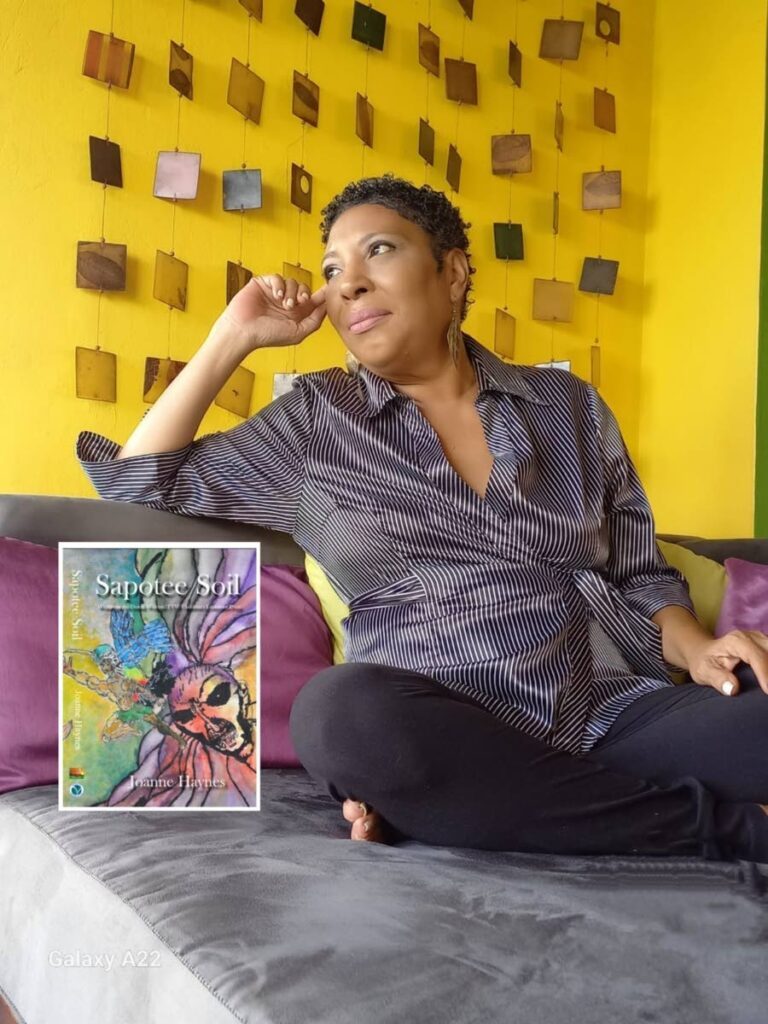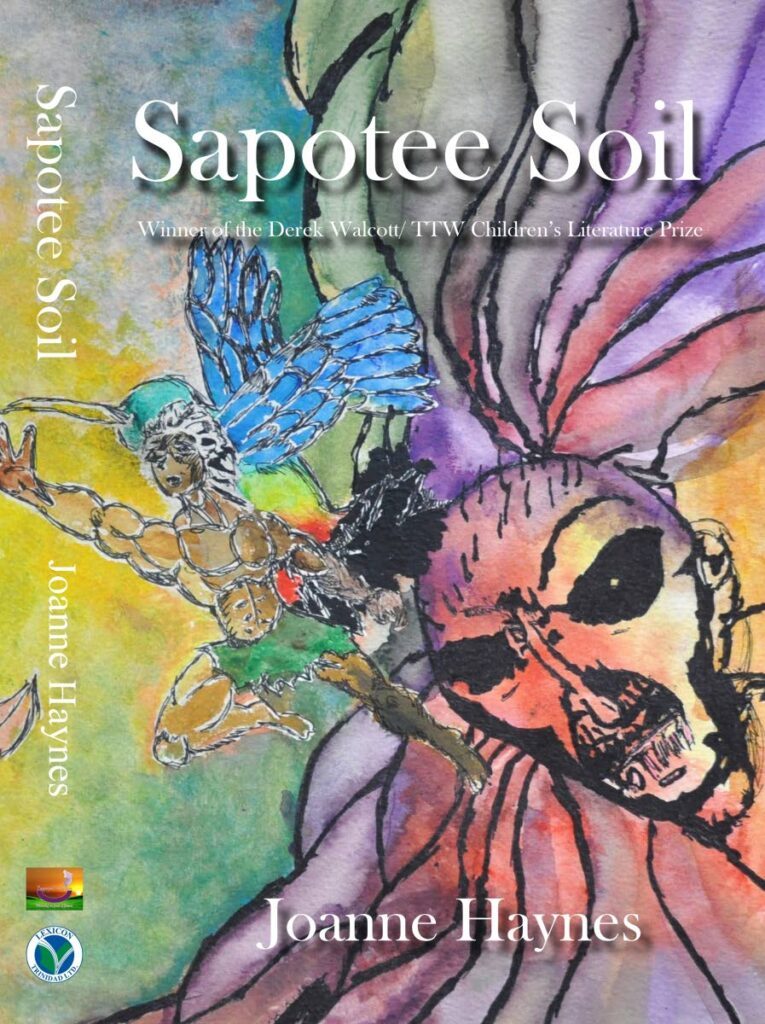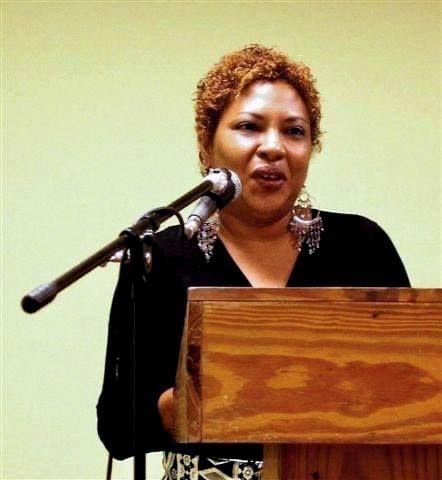Joanne Haynes tells stories of 'we' in Sapotee Soil

When author Joanne Haynes published Sapotee Soil – A Call to Memory over a decade ago, little did she know it would still be making inroads into the literary landscape, with absolutely no marketing on her part.
The book – a collection of ten short stories and narratives about Caribbean legends and folklore – has been selected for Nalis' 2023/2024 One Book Many Schools (OBMS) annual, nationwide, secondary-school reading programme and will be placed in secondary-school libraries.
In a release, Nalis said the initiative is to encourage students to read Caribbean literature and bring awareness of its importance and value, inspire a love for reading, introduce local authors, foster an appreciation of local culture, cultivate critical thinking skills, strengthen the use of media and information literacy skills and broaden the horizons of the students – all objectives that align with Haynes' LegendizeU project, which focuses on the way Caribbean people learn.
She said, "Having Sapotee Soil selected as the Nalis One Book Many Schools is a tremendous opportunity for reach, as it puts Sapotee Soil in the hands of every secondary-school Trinidadian student. I’m very grateful for another opportunity to serve" – one she intends to use to bring about change in the education system in Trinidad and Tobago.
“Instead of fitting our students into the world mould, we should be impressing on our students that the Caribbean is a value to share with the world.
“We are creative, colourful, dynamic, innovative. We learn through curiosity, imagination, investment and connectivity. We are creators not merely consumers,” she told WMN.
She said the foundation of LegendizeU comprises what she calls the four Cs – curiosity, colour-in, creativity and consciousness – and Sapotee Soil is the first tool of LegendizeU.
"Curiosity because the most powerful tool is to want to learn something. In colour-in I find the ways to bring colour to those black-and-white areas through storytelling and drama. Caribbean people are imaginative and vibrant, so that's where creativity comes in. And consciousness involves connecting the dots: making sense from the syllabus to life."
She said education is not just about passing exams, but also about doing what you do to the best of your ability.
"It’s about continuing to learn and to keep honing your skills, connecting to our space and connecting our space to the world."
Sapotee Soil, illustrated by Haynes' then 16-year-old son, Ka'en, was the winner of the 2005 Derek Walcott/TTW Children's Literature Prize.

"The cover of the book was one of his (Ka'en's) art SBAs," Haynes boasted.
One of the stories in it – The Fallen People of the Black Land – was adapted into an animated short film that was an official selection of the Anime Caribe and the TT Film Festival. Four other shorts were added to create the multi-media creative documentary Legends Revisited, which premiered at the 2016 Cannes Pan African Film Festival, and was nominated for a People's Choice Award at the TT Film Festival.
“I've come to think of Sapotee Soil as the book that keeps on giving…even 13 years later – and I never did any marketing. It really just keeps spreading and reaching, and I'm a little bit in awe of what it has been able to do on its own with no concerted effort from me. It keeps finding spaces where it needs to be found.”
Haynes sees the book as a history, social studies, language and drama and literature lesson that never feels like a lesson, because it follows the LegendizeU method of creating a space for learning.
“It's natural because learning is natural. If the environment lends to learning, it will take place naturally.”
Haynes, from San Fernando, is the author of two other books – Walking and The Coral's Tale. She is a 2001 Commonwealth short story finalist, the recipient of a 2012 Nalis Lifetime Literary Award, and the founder of Pepperpot Productions, an organisation through which she encourages patriotism among young people and teaches them about TT’s rich heritage.
She said although she didn't choose to be an educator, it chose her.
The youngest of seven children, she came from a home where education was always given prominence. Her mother, Zita Allong, was a teacher, so she and her siblings knew what they had to do. She graduated from UWI with a degree in political science – certification she only formally used once, as far as she can recall, as “a director on the board of Lake Asphalt at one time,” she chuckled.
“I went into the social sciences because I didn’t want to be a teacher…When I graduated, I went down other avenues because I couldn’t get a job in my field."
But then her mom suggested she should teach for a while, resulting in her teaching history at Moruga Composite.
“I strode into Moruga ready to teach, but Moruga taught me," she said with a laugh.
"I learnt that for many, education was not important, as my students who missed weeks of school to go hunting reminded me that, ‘Books doh put food on de table, Miss.’

"I learnt that my idea of an ‘educated’ person needed shifting, as my Moruga students taught me about Papa Neeza and Mother Cornhusk, how to tell when it’s a good time to go fishing, what food to plant when, and how not to get lost in the forest.
"And I learnt that many students were confused and disinterested and wondered where 'we' in this story.
"At that time the CXC syllabus demanded nine SBAs as part of coursework, and there I was reading from the textbook and trying to get my students to answer the questions – and was met with total boredom.”
Before August 1 was declared Emancipation Day in 1984, it was observed as Discovery Day, and the whole Moruga community would come out and re-enact the arrival of Columbus.
“But the students were just not making the connection between what was in textbooks and what they did. Eventually, I said, ‘Clear the desks and chairs and show me what you do every year on Discovery Day.'
“The classroom was transformed into a whole production, with music and acting. Everyone became interested and involved, and finally, they made the connection. That day the curiosity and interest in my Moruga students came out and made them want to learn.”
But one of the major challenges, she said, was that the literacy rate at the school was low.
“When I got the first set of SBAs I was taken aback by their inability to write. I asked them to present orally, and there was a complete difference.”
Haynes and the principal decided to find a way for the students to be able to present orally.
“They didn’t all get ones, but years later they were still involved in history because they were able to make the connection. They felt they had a voice, and that was the way in which the subject was transformed.”
That was the catalyst for the birth of LegendizeU in 1998.
“My teaching experience at Moruga showed me that how we learn is not how we are being taught, and what we learn is often not relevant to our lives and our reality."
Even years after Haynes left teaching and decided to write full time, her focus remained on giving young people a voice. For several years she hosted a writing competition for young people, asking them to submit their stories. Sapotee Soil was one of the prizes.
“I left education, but it never left me. My focus remained on young people, giving them a voice and space to tell their stories of place or people.”
Her goal now is to revolutionise education through her LegendizeU work, as she is extremely dissatisfied with the country's current education system.
“It is a colonial system that is destroying our young minds with its elitism, its insistence on testing and rote and regurgitation as hallmarks of intelligence, and its ignoring of our varying types of intelligence and the need to connect student reality with learning.
"I think there is a huge disparity between how we are being taught and how we learn. I want to use LegendizeU to find tools to fill gaps.
“Our education system needs to pivot on being Caribbean and bring play and passion into learning."
LegendizeU, she said, has been putting in the work over the years, trying to fulfil its mandate. There have been calls for stories, filmmaking projects and competitions for young people. Earlier this year Haynes presented an academic paper, LegendizeU – the Adventure of Learning, at the Caribbean Association for the Advancement of Curriculum Studies.
Next year she will produce a third edition of Sapotee Soil to include LegendizeU discussions and activities. She has issued an ongoing call for students to submit their stories to her website, joannehaynestt.com.
"And for anyone interested in obtaining a copy of Sapotee Soil, I'm taking pre-orders via my website, because it is not sold in stores."
Of her next writing project, she said, "I started doing my family tree, out of curiosity. Gradually, six years of writing and research turned into a book. Then covid hit and paused everything.
"So next year I'm hoping to publish my fourth book and first non-fiction."
-

Comments
"Joanne Haynes tells stories of ‘we’ in Sapotee Soil"